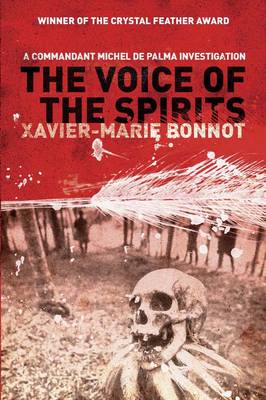
EURO CRIME
Reviews

Bonnot, Xavier-Marie - 'The Voice of the Spirits' (translated by Justin Phipps)
Hardback: 304 pages (Mar. 2012) Publisher: MacLehose Press ISBN: 085705077X
THE VOICE OF THE SPIRITS is the third in Xavier-Marie Bonnot's series of Marseilles based police procedurals. This series features police inspector De Palma, the Baron. At the start of the novel, De Palma is called to an unusual murder scene, after being tipped off by a burglar who found a corpse that he hadn't bargained for. Renowned neurologist Dr Delorme has been found dead in the study of his villa, with a painted tribal mask on top of his face, and a quote from Freud left in a prominent position on his desk, with an eerie sound like a flute audible somewhere nearby. The cause of Dr Delorme's death is not immediately apparent, though he has clearly been murdered.
More deaths follow, in Marseilles and Paris, amongst the underworld and those involved with the illegal trade in cultural artefacts, which appear connected by similarities either in the method of killing or in the literature found near the scene. With little to go on, other than the anthropological interests of the killer, De Palma starts to look further into Dr Delorme's connections with Pacific tribes for clues. He finds out that Delorme went on a ground breaking expedition with his friend, Robert Barrancourt, to the Sepik river in Papua New Guinea in the 1930s. Assisted by the local guide and translator, Kaingara, they found out about the local traditions of headhunting and, exploring remote villages unused to Europeans, bartered with the locals to purchase many cultural artefacts including trophy skulls.
As the book progresses, the point of view shifts between the Baron, the killer (who remains anonymous for much of the novel) and is interspersed with extracts from the expedition log and from social scientists such as Freud and Margaret Mead who wrote about the headhunters' traditions. The author sheds a sometimes unflattering light upon the ethics of the early trade in ethnographic objects with European museums and private collectors, and upon the sometimes patronising attitude taken towards "savages" by these early 20th century writers. Bonnot takes an even-handed approach, eschewing easy judgements upon whether the departure from traditional cultural values and ascendancy of the Church in the Sepik area is a good or bad thing.
THE VOICE OF THE SPIRITS is a rather unusual crime novel. Its main focus is how the behaviour of the early anthropologists and explorers affected the indigenous Papuan villagers and their culture, and how the culture clash has led to deaths in the present day. The more conventional elements of a police procedural, the relationships between the Baron and his police team, investigations at the port and amongst the underworld, and even a new love interest for the Baron seem rather perfunctory by comparison. The author is not afraid to let supernatural elements, such as the voice of the spirits of the title remain ambiguous. Overall this is an intriguing and enjoyable crime novel, definitely out of the run of the mill of typical police procedurals, with the end section in particular requiring a suspension of belief to a degree.
Laura Root, England
April 2012
More European crime fiction reviews can be found on the Reviews page.